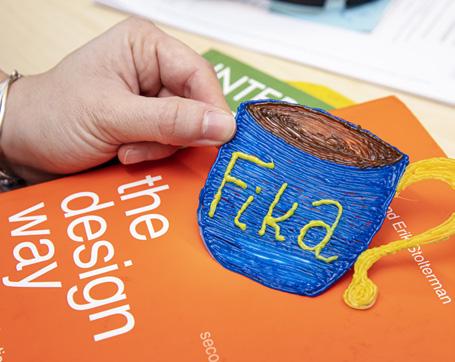
4 minute read
Userfriendly
TECHNOLOGY Wants user-friendly
Use your intuition instead of complicated manuals! Vasiliki Mylonopoulou is passionate about making computers and software as user-friendly as possible.
Advertisement
– It should be easy to use new technology, because otherwise it is useless, she says.
VASILIKI MYLONOPOULOU was a computer engineer who became obsessed with coding and programming. Back home, in Thessaloniki, Greece, at the Technological Educational Institute, she would remain at her desk, often for hours at a time, until she had fixed a bug. But her curiosity brought her to Umeå to study a master’s degree in Human-Computer Interaction, and suddenly a whole new world opened up.
– I instantly fell in love with this subject. Suddenly, it occurred to me that the technology itself must be able to show you how it should be used.
We can develop lots of cool IT products, but if users do not understand how to use them, they will not work, says Vasiliki Mylonopoulou
SHE BELIEVES THAT there is often a mentality among computer engineers that if they themselves can use what they have designed, it means that it works – it is just the users who are stupid. In Human-Computer Interaction, we want to change the perspective and put the focus on the human user instead of the machine.
– My job simply involves making computers easier for people to use, says Vasiliki Mylonopoulou. You should not need to read complicated manuals, you should be able to use your intuition.
Vasiliki Mylonopoulou has been a postdoctoral fellow at the division of Human-Computer Interaction, at the Department of Applied Information Technology, since October last year. Together with two colleagues, she is creating a new course on the subject, for which she will also be the course lecturer.
– IT IS INCREDIBLY challenging. In mathematics, there is right and wrong, but that is not the case in this field. We will try to understand how people think and how they intuitively use technology. It will be interesting to see how the students handle this uncertainty – that there are no correct answers.
In parallel with her work with students, she also conducts her own research. She is currently running the Digital Seniors project, together with her colleague Alexandra Weilenmann, which involves creating design tools to design technology for our older selves. The focus is on exploring whether our age affects how and why we use technology. And how we can adapt the technology to meet our future needs as seniors.
– I think there has been too much focus on looking at what older people cannot do when it comes to new technology. Personally, I find it more interesting to study what they actually can do, and build design tools based on that.
THE PAST FEW years have been hectic for Vasiliki Mylonopoulou and she is now looking forward to settling in Gothenburg for a couple of years. After her master’s degree in Umeå and before starting her postdoctoral position at the University of Gothenburg, she spent three years as a Marie Curie doctoral student at the University of Oulu, in Finland. A position that involved 36 trips over the course of three years.
– It was tremendous fun and incredibly hectic. There were 15 doctoral students from different European countries who participated in the programme, and we studied to become experts in how to use IT to bring about positive changes in health behaviours, she says. At the age of 34, Vasiliki Mylonopoulou already has an impressive CV. However, an academic career was not necessarily an obvious choice.
– I HAVE DYSLEXIA, she says. And when I was growing up in Greece, there was no special support for that at school. That is why I chose to become a computer engineer which focuses much more on mathematics than reams of text, even though I was probably more interested in psychology as a subject.
Today, she can combine her interest in human behaviour with her knowledge of technology. She is also interested in arranging and participating in activities that support people with learning difficulties who work or study at the University of Gothenburg.
– Yes, now all the pieces seem to have fallen into place, she says. And I am really enjoying Gothenburg, both from a work and leisure perspective.
Vasiliki Mylonopoulou

Age: 34. Profession: Post-doctoral researcher in Human-Computer Interaction at the Department of Applied Information Technology. Lives in: Gothenburg Grew up in: Thessaloniki, Greece. Family: Partner, as well as a family in Greece – including her mother, father and older brother. Interests: Playing computer games, power yoga and pole gymnastics.
But how did you adjust to our Nordic climate when you are used to a Mediterranean climate?
– There is not enough snow in Gothenburg. I love winter, even when it is –20 °C. It was wonderful to come to Umeå from Greece – Christmas lasted 6 months! she says, laughing.










